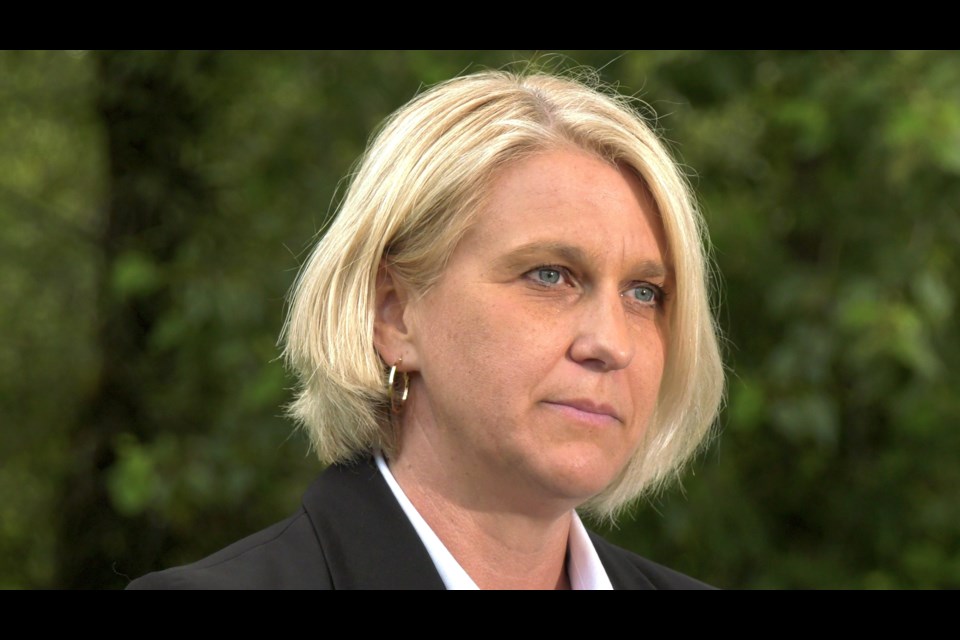An ardent critic of the B.C. government’s mental health and addictions policies is calling out Premier David Eby for not following through on a recommendation from two experts to create involuntary care units for people at high risk to harm others.
Elenore Sturko, BC United’s former mental health and addictions shadow minister, pointed to a report completed in 2022 by former Metro Vancouver Transit police chief Doug LePard and health researcher-criminologist Dr. Amanda Butler that recommended the creation of “low secure units” for troubled individuals.
“We can never know for certain if we could have prevented the terrible attack that happened in Vancouver last week, but that is precisely the type of individual that these beds are meant for,” said Sturko, referring to the Sept. 4 homicide and assault downtown that police are treating as unprovoked stranger attacks.
Sturko, the MLA for Surrey-South, left BC United in June to join the Conservative Party of B.C. and is seeking re-election in Surrey-Cloverdale in the Oct. 19 provincial election. Sturko is a former RCMP officer.
She said government should have made creating such units a priority, given the lack of widespread psychiatric care for people in B.C. with a history of violence. Sturko described the government’s inaction as “a failure.”
“The [secure units] would allow for ongoing treatment by psychiatrists, by the professionals that are trained to deal with these circumstances, and this is what is missing in the province,” she said, noting a Conservative government would commit to at least 100 low secure beds, if elected.
The government hired LePard and Butler to investigate and report on prolific offenders and random violent attacks, and recommend actions to get people the care they need while simultaneously reducing violence in the province.
Mental Health Act
The authors said the low secure units would be for people with complex mental health and substance use needs who are “not appropriate for forensic care but whose needs exceed the structural design and capacity of an open in-patient hospital unit.”
The units should be designed to provide intensive rehabilitation as well as social, housing, education and employment services, said the authors, recommending government refer to best practices guidance for low secure care developed by the United Kingdom.
The National Institute for Health and Care Excellence guidelines for improving service user experience in adult mental health services should also be considered in creating the units, they said.
“As with all other involuntary care settings, strict accountability mechanisms should be in place to ensure compliance with the Mental Health Act as well as access to independent rights advice services,” the authors said.
“Safeguards and oversight will be especially important given B.C.’s history of lack of compliance with the Mental Health Act.”
In addition, ongoing legal support should be provided to people in the units accused, charged or convicted of a crime. A person’s placement in a low secure unit should only be considered after “all appropriate voluntary options” have been exhausted, they said.
Dr. Daniel Vigo
Sturko’s concerns about the lack of low secure units come the same week that Eby is expected to update reporters Sept. 13 on Dr. Daniel Vigo’s work regarding the needs of people with complex mental health and addiction challenges.
The government appointed Vigo in June as B.C.’s chief scientific advisor for psychiatry, toxic drugs and concurrent disorders. Vigo is a psychiatrist, psychologist and public health specialist leading the Mental Health Systems and Services Lab at the University of B.C.
“In his role, Dr. Vigo is looking at all options, including mandatory treatment, to find ways to provide better care for this growing population and keep our communities safe,” said an emailed statement Tuesday from the Ministry of Mental Health and Addictions.
The ministry said Eby recently emphasized the importance of ensuring involuntary care is delivered with dignity and respect, while providing the necessary supports to help individuals stabilize and, where possible, regain independence.
“The province will have more to say on this work in the coming days,” said the statement, noting the LePard-Butler recommendation to create low secure units is “under active consideration” and that “we agree that more assertive treatment options are needed for people with serious mental health and addictions issues, and brain injuries.”
'Complex care housing'
The ministry pointed to the creation of “complex care housing” launched in 2022 as part of the government’s efforts to meet the needs of people with overlapping mental health and addiction issues.
The housing, which also addresses the needs of people with chronic conditions such as brain injury or physical, intellectual or developmental disabilities, has expanded services to more than 500 people across B.C., the ministry said.
“B.C. continues to make historic investments in mental health and addictions supports, expanding crisis response teams and enhancing access to treatment and rehabilitation services through a scaleable care model,” the ministry said.
Meanwhile, Brendan Colin McBride, 34, of White Rock has been charged with second-degree murder and aggravated assault in connection with the Sept. 4 attacks in Vancouver that left 70-year-old Francis David Laporte dead and another man in his 50s with a severed hand.
Vancouver Police Chief Adam Palmer told reporters last week that the suspect “appears to be a very troubled man who has a lengthy history of mental health-related incidents, which have resulted in more than 60 documented contacts with police throughout Metro Vancouver."




